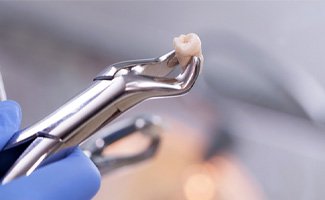Root Canal Therapy in Ocala
What is a root canal? Does it hurt? Do I need a root canal? These are common questions asked by patients. At Weldon Implant and Cosmetic Dentistry of Ocala, we are dedicated to educating all within reach about topics in oral healthcare and dentistry. As a result we have answered some frequently asked questions below regarding root canals.
What is a Root Canal?
The segment of dentistry dealing with root canals is termed endodontics. A root canal is a common dental procedure performed to save a tooth when inner material, called “pulp,” becomes infected and causes pain, sensitivity, infection, and/or swelling. When performed in time, a root canal can save a tooth from further decay and removal. In most cases, root canals can be done non-surgically by removing the diseased pulp and cleaning and sealing the root canal. Even though the normal source of vitality including blood and nerve supply has been removed from the tooth, it can remain in the oral cavity and save the patient from more expensive and invasive alternatives like dental implants and dentures.
What is Dental Pulp?
The dental pulp is a complex segment in the center of the tooth that includes nerve, blood, and lymphatic supply. The pulp extends down the root canal of the tooth through an opening into the jawbone called the apical foramen. The nerves and blood vessels pass through this opening. The pulp is essential to the life of the tooth. It provides developmental, sensory, and vitality functions.
Why Would the Pulp Need to be Removed?
Pulp needs to be removed when it is irreversibly infected or dead. The source of infection can be from decay, trauma, gum disease, or a combination of these. This infection if neglected can spread and cause swelling in the face and neck, bone loss around the root, and drainage problems. Infected pulp should be removed as soon as possible.
How Would I Know if a Root Canal is Needed?
Your dentist is the only one who can properly diagnose the problems that would require a root canal to be performed. There are many signs and symptoms that can also be indicative of other problems. Possible signs would include but are not limited to toothache, pressure, sensitivity to heat or cold, or swelling of the gums.
What is the Procedure?
First, x-rays are taken to help determine the severity of the problem and the shape of the canals. A series of files of increasing diameter are utilized to clean out the infected tissue within the pulp chamber. After the root canals are cleaned out thoroughly, the canal is then sealed. Finally, a tooth that is requiring a root canal often also requires a restoration. A crown, a crown and post, or other restorations are often utilized. If not done, often the tooth is susceptible to fracture in the future.
Do Root Canals Hurt?
Dentistry has evolved significantly in many of our lifetime’s. In the past, many procedures that are routine now were complex and caused pain to patients. Root canals now can be a routine procedure. The dentist will thoroughly anesthetize the tooth that will be operated on so the procedure itself will be painless. Some patients will experience slight post operative sensitivity but endodontics by nature is not painful.
Understanding the Cost of Root Canals

Because every patient is unique, there is no one-size-fits-all cost of a root canal in Ocala. Instead, there are a number of factors that may contribute to the final cost of treating your damaged or decayed tooth. Dr. Weldon can provide you with an accurate cost estimate and discuss payment options after they examine your tooth or teeth.
Factors That Can Affect Root Canal Cost

During your consultation, Dr. Weldon will examine the tooth or teeth in question before discussing your personal treatment plan and associated costs. Some of the various factors that may influence the cost of your root canal include:
- Tooth Location – Back molars typically have more root canals than front teeth and therefore cost more to treat. While back molars usually cost between $500 to $2,000 each, front teeth often run about $300 to $1,000 each.
- Complexity – Complex roots canals may require a visit to a specialist, which will add to your overall costs.
- Additional Services – Dr. Weldon may recommend placing a crown on your tooth after your root canal to protect it. The restoration will carry an additional cost.
Is It Cheaper to Pull My Tooth?

If you’re worried about the cost of a root canal, you may be considering just removing the tooth in question instead. However, although a tooth extraction may cost less than root canal therapy upfront, you may end up paying more in the long run. When even one tooth goes missing, the remaining teeth nearby can shift out of place. As a result, you may experience bite problems, difficulty eating, and general discomfort. To prevent these problems, you may need a bridge or dental implant to replace the extracted tooth, which of course will come with an additional cost. Rather than removing a tooth and paying to replace it, the more cost-effective option may be to save your natural tooth with a root canal. However, don’t wait too long after learning you need a root canal to schedule one. Your tooth could worsen over time and you may be forced to turn to an emergency dentist in Ocala to extract the tooth anyway.
Does Dental Insurance Cover Root Canal Therapy?

Most dental insurance companies consider root canal therapy to be a major procedure and cover anywhere from 50% to 80% of the cost. However, every insurance plan is slightly different. Be sure to contact your insurance provider to confirm your coverage before scheduling a root canal. Our team will be happy to help you understand the details of your insurance coverage and maximize your benefits.
Other Options for Making Root Canal Therapy Affordable

Don’t have dental insurance? Don’t worry! You may be able to take advantage of flexible dental financing through CareCredit. A trusted partner, CareCredit allows eligible patients to break down the cost of a root canal in Ocala and other dental treatments into affordable monthly payments. Many CareCredit plans involve little to no interest, making them ideal for almost any budget. Ask our staff for more details!
At Weldon Implant and Cosmetic Dentistry of Ocala, we believe every patient deserves a healthy smile without financial stress. Don’t hesitate to contact our office if you have questions about the cost of a root canal or to schedule a consultation.
Root Canal FAQs

At your last routine checkup, did your dentist in Ocala say that you need a root canal? Because there are a lot of misconceptions surrounding the procedure, you may be nervous to schedule your appointment. However, it’s not as bad as you think! To help ease your nerves, we’ve decided to answer some frequently asked questions below. If you’d like to speak to a member of our team, feel free to reach out for personal assistance!
How Long Does It Take to Recover from a Root Canal?
Because every case is unique, the recovery time varies from patient to patient. However, most people will be able to return to their usual routine the day following their procedure. If your job requires physical labor, you’ll need to take at least the next two to three days off. Otherwise, the strenuous exercise can delay the healing process by diverting blood from the site. Make sure you diligently follow aftercare instructions to promote a faster recovery. Should your pain worsen or persist after a few days, contact our office right away for help.
How Much Pain Is Normal After a Root Canal?
While the procedure itself shouldn’t hurt, you’ll likely experience mild discomfort and soreness over the next few days. Fortunately, these symptoms are easily manageable with over-the-counter pain medication (i.e., acetaminophen and ibuprofen) and cold compresses. You should avoid chewing hard foods while you heal as it can worsen your discomfort.
Can I Take Antibiotics Instead of Getting a Root Canal?
Antibiotics are commonly used to treat bacterial infections in almost every part of the body. However, they’re not effective for tooth infections. That’s because antibiotics travel through the bloodstream to target infected areas, and the bloodstream does not reach the pulp of a tooth. As a result, they cannot eliminate an infection there. Your only treatment option is root canal therapy. If the tooth is severely infected, you may even need to opt for extraction.
Can Root Canals Be Prevented?
Yes! One of the best ways to avoid needing a root canal is by taking proper care of your smile. Brushing twice a day, flossing daily, rinsing every day with an ADA-approved mouthwash, and visiting your dentist regularly are all excellent practices that can help minimize the risk of bacteria reaching a tooth’s pulp. Some additional ways to protect your oral health include maintaining a healthy diet, wearing a mouthguard while playing sports or sleeping, and avoiding poor dental habits (i.e., biting fingernails, using teeth as tools, smoking).

